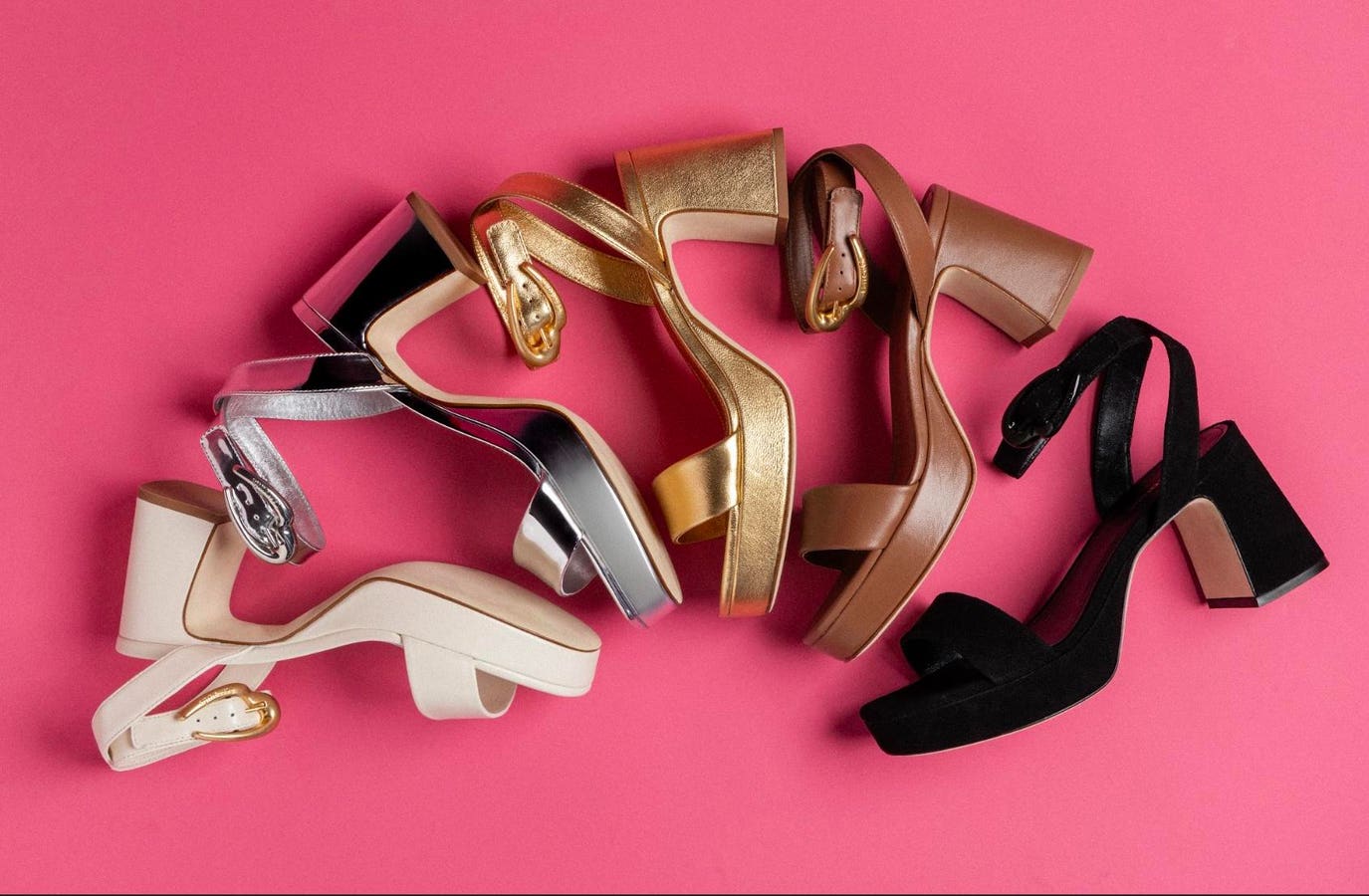Larroudé’s vertical integration has helped the brand grow close to 9 figures in under 5 years.
Seasoned fashion director Marina Larroudé and her husband, financier and business operator Ricardo Larroudé, launched their namesake footwear brand in 2020, with the consumer and community in mind. Since its debut, Larroudé has received countless industry accolades. The Larroudé’s launched their business during the pandemic, when both Marina and Ricardo were unemployed, scraping together their 401(k)s and building everything from the ground up. Most recently, the brand was included in Fast Company’s prestigious list of the Most Innovative Companies of 2024 and named Brand of the Year at the Footwear News Achievement Awards, recognized for producing high-end quality footwear at accessible prices while redefining the luxury fashion market.
In just under five years, they have grown from a five person team to a workforce of over 500, with offices in New York, São Paulo, and Sapiranga, Brazil-home to their own factory. As they inch closer to becoming a nine figure business, the Larroudés’s credit their vertically integrated manufacturing and distribution for scaling in a short period of time. Vertical integration refers to the practice of controlling and owning the entire supply chain including raw materials, manufacturing and distribution. Although there is a higher barrier to entry, once a corporation can achieve vertical integration, margins can become leaner, shipping times shorter and the ability to produce new inventory more often becomes more feasible.
Marina and Ricardo Larroudé, founders of Larroudé.
“From day one we knew that if we wanted to build a brand with long-term value and control over quality, pricing, and timing, we had to own the process. In fashion, especially footwear, you’re only as strong as your product and for that you need control over your supply chain. Owning our manufacturing in Brazil meant we could produce at a standard that reflected our vision — not someone else’s compromise,” the Larroudé’s shared. “We approached it in phases. First, we launched with trusted partners in Brazil to test our designs and build market traction. Once we proved demand and developed a strong product identity, we began investing in our own factories — machinery, people. We brought the sourcing, development, production, and logistics under one roof. Today, that includes everything.”
The decision to transition to a fully integrated supply chain was made during the second year, “The inflection point came during our first months building operations in Brazil, global supply chains were a mess, and we realized that if we didn’t control our own production, we’d always be at the mercy of external forces. That’s when we doubled down and opened our first factory in Sapiranga, Brazil, a region with an extremely rich shoemaking history. By cutting out the middlemen, we pass the value directly to our customers. You’re getting designer-level quality, crafted by artisans, at a fraction of the traditional luxury price. We’re not paying markups to suppliers or agents. We are the factory,” they added.
Inside of Larroudé’s factory in Sapiranga, Brazil.
This has helped Larroudé implement a Direct-to-Demand (D2D) strategy meaning the brand only produces what it sells, enabling it to showcase new designs ahead of time, building excitement and anticipation aligned with customers’ preferences in real time. By offering shoes on pre-order, Larroudé is streamlining production processes and ensuring minimal waste. “We’ve seen faster production cycles, more flexibility with inventory, better margins and you produce a lot more of what you sell. But more than anything, it’s given us freedom — we can test and scale new designs rapidly, control quality from the ground up, and ensure ethical working conditions. We’re proud that over 60% of our workforce are women, and a majority are in leadership roles. Everyone is covered by health insurance,” they explained in regards to how D2D model allows them to innovate with their designs and workforce.
Larroudé’s commitment to excellence extends beyond crafting beautiful products, it’s also about championing the people behind them. With a focus on full transparency in the production processes, Larroudé prioritizes workers’ rights, benefits, and opportunities for growth, leading us to open our own factory in Brazil. The facility in Sapiranga, combines production, logistics, marketing and administration under one roof in an area of 10,000 square meters and a monthly capacity of roughly 30,000 pairs and growing. Certified by the Leather Working Group, the tanneries Larroudé works with are as committed to sustainable practices as they are in reducing environmental impact.
Larroudé’s vertical integration allows them to design and innovate new luxury styles at rapid speed.
Currently, Larroudé has an eight figure yearly revenue with a nine figure yearly revenue soon approaching. Becoming vertically integrated has allowed them to grow faster in a shorter speed of time. It also give’s the company a major edge when it comes to tariffs. Because Larroudé os produced in Brazil and ships directly to consumers, the company avoids many of the rising costs tied to tariffs and container surges affecting imports from Asia. It also allows them to skip the constant renegotiations with third-party factories or becoming stuck in geopolitical disruptions.
While other shoe brands may be slowing down due to the uncertainty from the tariffs, Larroudé is only speeding up. The brand is planning more unexpected collaborations, limited drops, and fashion-forward storytelling. Operationally, it is investing in deeper AI-driven inventory planning, global expansion and exploring new verticals such handbags and ready-to-wear. The Larroudé’s emphasized that when you own the supply chain, the possibilities are endless.




